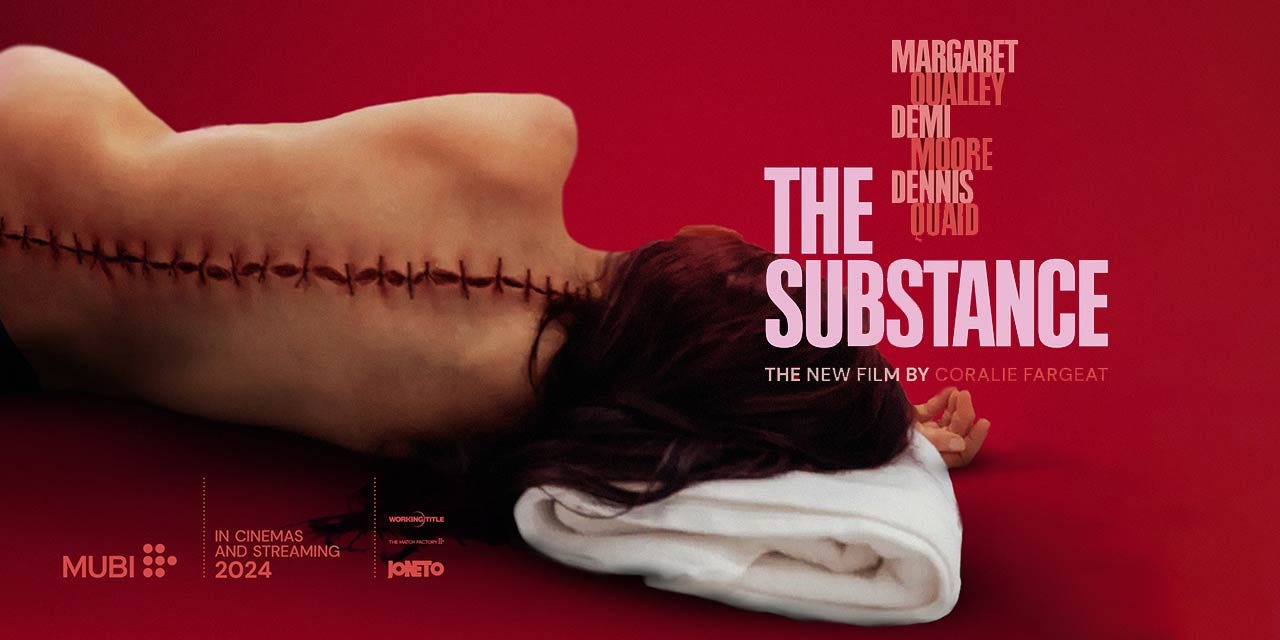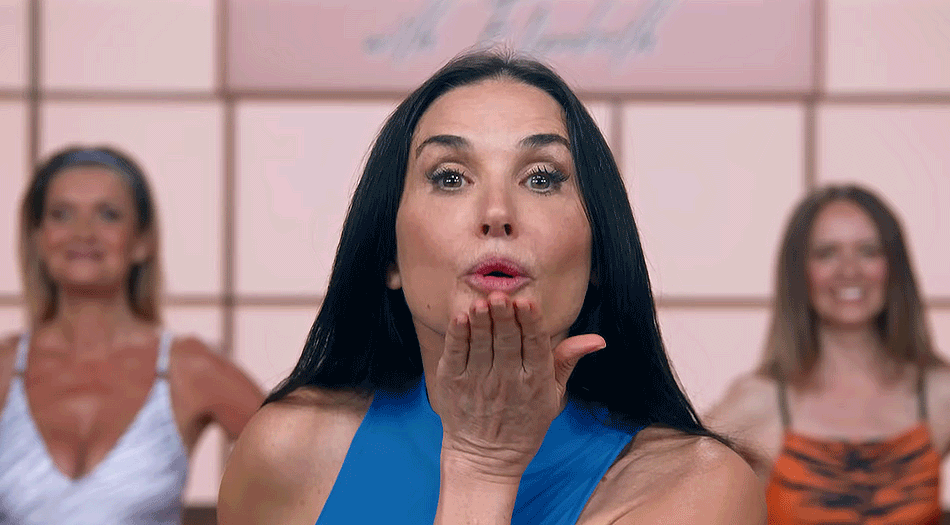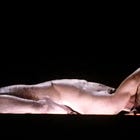The Substance: Body horror's reflection on beauty, aging, and identity
Coralie Fargeat’s visceral film bludgeons its themes home—offering a grotesque yet strikingly relevant message for naturists
Editor’s note: With the Oscars on March 2nd, we’re revisiting The Substance, nominated for five awards, including Best Picture, Best Director, and Best Actress. The film is now streaming on Mubi.
This review may contain spoilers.
The Substance is a mad, mad film. At times it’s more like a particularly unhinged episode of Black Mirror or the Twilight Zone than it is a movie, and it revels in violent and grotesque body horror. It's not subtle, and often feels like it’s bludgeoning you with what it wants to say. It is absolutely the wildest movie that I saw in 2024, nothing else even comes close. It is certainly not for the faint of heart, especially those who hate needles.
But why am I reviewing it here? Because, while it’s a pretty simple, gruesome movie, all things considered, its messages should be strikingly familiar to the naturist community.
Written, directed, co-edited, and co-produced by Coralie Fargeat, the Substance is the story of an aging Hollywood star named Elizabeth Sparkle, played by Demi Moore. On her 50th birthday, Elizabeth is fired from her fitness show Sparkle Your Life by her disgusting producer Harvey, played by Dennis Quaid. On her way home, distracted by a billboard with her face on it being taken down, Elizabeth is in a horrible wreck that she amazingly survives unscathed.
At the hospital, a tearful Elizabeth is approached by a male nurse who mentions what a “perfect candidate” she is and discreetly shoves a USB drive into her coat pocket. The drive contains an ad for something called the Substance, which a disembodied voice played by Yann Bean promises will create a newer, better version of yourself. Filled with so much self loathing, Elizabeth decides to give it a try.
Spoilers ahead
With this being such a new movie, I’m hesitant about spoilers, but do I feel like I need to explain a little about what happens when Elizabeth decides to take the Substance: a new, younger version of herself emerges, literally from Elizabeth’s back.
This new being, played by Margaret Qualley, takes on the name Sue. Sue lives off of… it’s never quite clear but it seems to be spinal fluid from the unconscious Elizabeth’s back, only having enough to exist for a week before the two need to swap places for another week.
Sue goes off and takes Elizabeth’s old job, leading a new fitness show called Pump It Up. While she enjoys the spoils of youth and beauty, the one week time limit becomes too restrictive to Sue, and she tries to steal more time, causing Elizabeth to waste away.
While the disembodied voice they speak with continually reminds Elizabeth and Sue that they are one, not separate people, and need to “respect the balance,” contention between the two rises, culminating in a wild and bloody finale as Sue is set to appear on a big New Year’s show.
Dynamic return for Demi
Admittedly, I haven’t watched a lot of Demi Moore’s films, but it makes sense why she was perfectly cast here: the woman was a colossal sex symbol in the 90’s. I never watched it, but the VHS cover to Striptease, for which she was the highest paid actress at the time, is burned in my memory from seeing it all the time in video stores as a kid. I was stunned to see this gorgeous nude woman so, well, nude in a public setting. She was a superstar, but in recent years more or less dropped off the radar, focusing on philanthropic work and taking roles in smaller movies and TV shows. This is an incredible, dynamic return for her, and not even her first foray into horror! The emphasis on the fitness shows feels a little outdated today, but again, those were also big in the 90’s.
Moore, who was 59 or 60 during filming, appears nude in the film, but is not at all portrayed like a sex symbol. Her age shows as she is frequently examining herself in front of the mirror. Her superstar status has faded, she’s not who she once was, and that’s what leads to her losing her job. She abhors the person she sees in the mirror.
This is an obvious parallel to the way Hollywood frequently chews up and spits out actresses, especially as they age and are no longer seen as beautiful by rigid, narrow standards. We also bear witness to her rapid deterioration due to Sue’s theft, and it’s quite shocking, especially as it accelerates Elizabeth’s own self-loathing along with all the binge eating she does on her active weeks.
Qualley’s emergence
Margaret Qualley is another actor I don’t know much about, but she seems to have been making a name for herself, appearing in several big films, and started modeling at 16 after training as a ballet dancer, so coming in to play a younger Demi Moore makes perfect sense.
When we first see Qualley in the film, she is also fully nude, having just emerged from Elizabeth’s spine. It’s not glamorous, but when she gets a good look at herself in the mirror, you can see the joy and confidence on her face as she examines this new form.
After this, the camera looks at Sue in an entirely different, highly charged and sexualized way. On the way to audition for the fitness show, Sue ditches Elizabeth’s bright yellow coat for a sparkling pink spandex one piece, and we see in detail how tightly it fits her frame. There are constant close-ups of Qualley’s body, slow motion is used during the fitness show scenes, and the men around her go rabid at the mere sight of her. She is a stark contrast to Elizabeth in so many ways. Even the score changes when Sue is onscreen.
The male gaze
And then there are the men in this film: virtually all of them, not just Dennis Quaid’s atrocious Harvey, are leering, objectifying presences in these women’s lives. Elizabeth runs into a former classmate early on, but he acts less like he’s seen an old friend and more like he stumbled upon a goddess.
For all his compliments and cheer, for all that his behavior makes her feel better, it’s still a form of objectification. These people do not see Elizabeth as a person at all, nor do they see Sue as human either. These men are the ones they’re performing for, the ones who determine their value, the ones that Elizabeth is basically destroying herself for, and they do not care at all what happens to these women so long as they’re able to profit off of their looks.
Unsubtle substance
It’s not subtle, and it’s not meant to be. This movie is bludgeoning you in the face with its ideas over the course of its two and a half hour runtime, making sure you know exactly what it wants to say in the most explosive manner possible. It can be a lot, it’s extreme, and it’s maybe a little too long, but it’s also impressive. I’m amazed to learn that it’s been nominated for five Oscars, including best picture, best director, and a best actress nomination for Demi Moore! That’s astonishing for a horror film! It’s definitely making an impact, to say the least.
There is one thing that I’m personally a little muddled on: it’s unclear if the separation between the two was meant to happen or not. The words “remember, you are one” are repeated, but Sue absolutely becomes a separate entity, at least to me. Is it just our nature? I do naturally consider my own closeted, past self a different person, and I have to remind myself that we are the same, that I wouldn't be who or where I am today without them. I don’t know what the answer to this is! What do you think? 🪐








